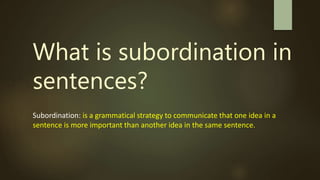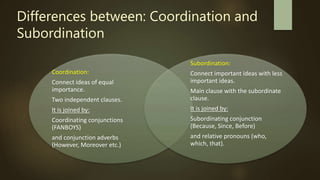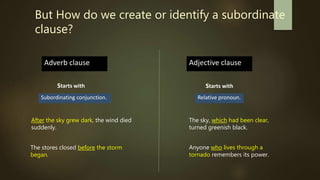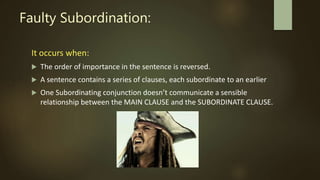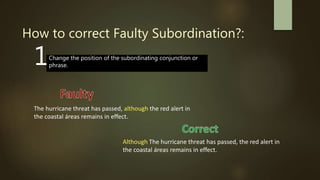Subordination
- 1. What is subordination in sentences? Subordination: is a grammatical strategy to communicate that one idea in a sentence is more important than another idea in the same sentence.
- 2. But How? By placing the more important idea in an MAIN CLAUSE and the less important idea in a SUBORDINATE CLAUSE Depending on the meaning you want to deliver. Jack Sparrow faced a dangerous storm while he was looking for the treasure. MAIN CLAUSE SUBORDINATE CLAUSE When he came to the island, he just found a chest with sand and shells. SUBORDINATE CLAUSE MAIN CLAUSE
- 3. Without Subordination Hereâs a passage with the same message as the example above, but without subordination. Jack Sparrow faced a dangerous storm. He was looking for a treasure. He came to the island. He found a chest with sand and shells.
- 4. Time Reason/Caus e Place Contrast Purpose/res ult Condition After before once until when whenever while As because since wherever where although even though though whereas while in order that so that that if Only if even if provided that unless SUBORDINATING CONJUNCTIONS Each SUBORDINATING CONJUNCTION has its own meaning. When you choose one, be sure that its meaning accurately expresses the relationship between the ideas that you want to convey.
- 5. Differences between: Coordination and Subordination Coordination: Connect ideas of equal importance. Two independent clauses. It is joined by: Coordinating conjunctions (FANBOYS) and conjunction adverbs (However, Moreover etc.) Subordination: Connect important ideas with less important ideas. Main clause with the subordinate clause. It is joined by: Subordinating conjunction (Because, Since, Before) and relative pronouns (who, which, that).
- 6. EXAMPLES: ïĩ (Coordinated) ïĩ Susan forgot to set the alarm so she overslept. (Coordinate conjunction) ïĩ Susan forgot to set the alarm; therefore, she overslept. (Conjunctive adverb) ïĩ (Subordinated) ïĩ Susan forgot to set the alarm because she was tired. (Subordinate conjunction) ïĩ Susan, who was tired, forgot to set the alarm. (Relative pronoun)
- 7. But How do we create or identify a subordinate clause? Adverb clause After the sky grew dark, the wind died suddenly. Subordinating conjunction. Relative pronoun. Adjective clause Starts with Starts with The sky, which had been clear, turned greenish black. The stores closed before the storm began. Anyone who lives through a tornado remembers its power.
- 8. NOW WE ARE ļé·ĄīĄķŲģÛâĶ
- 9. Faulty Subordination: It occurs when: ïĩ The order of importance in the sentence is reversed. ïĩ A sentence contains a series of clauses, each subordinate to an earlier ïĩ One Subordinating conjunction doesnât communicate a sensible relationship between the MAIN CLAUSE and the SUBORDINATE CLAUSE.
- 10. How to correct Faulty Subordination?: 1Change the position of the subordinating conjunction or phrase. The hurricane threat has passed, although the red alert in the coastal ÃĄreas remains in effect. Although The hurricane threat has passed, the red alert in the coastal ÃĄreas remains in effect.
- 11. 2 Change the SUBORDINATING CONJUNCTION that doesnât communicate a sensible relationship between clauses. Because Beethoven was deaf when he wrote them, his final symphonies were masterpieces. Although Beethoven was deaf when he wrote them, his final symphonies were masterpieces.
- 12. 3 To correct excessive subordination, break the sentence into two or more sentences or change some of the dependent clauses to modifying phrases. Sara, who was a San Francisco-native who lived in the University Park Apartments, enjoyed those special moments when a group of students who also came from Northern California visited her dorm, which was lonely for most of the school year. Sara, a San Francisco-native, lived in the University Park Apartments. Because her dorm was lonely most of the school year, she enjoyed those special moments when a group of students who also were from Northern California would visit her.
- 13. CONGRATULATIONS ïĩ NOW YOU ARE A MASTER IN CORRECTING FAULTY SUBORDINATION. Are you sure?.
- 14. Item 1 To impress Deepa, his date, Ryan labored over the chicken stir fry; __________, she took offense that he was serving meat after she had explained her vegetarianism. A. furthermore B. moreover C. however D. additionally To impress Maria, his girlfriend, Ryan cooked a big chicken; __________, she took offense that he was serving meat after she had explained her vegetarianism. A. furthermore B. moreover C. however D. additionally
- 15. Item 2 __________ Thomas scores a 100 on the final exam, he cannot pass College Algebra, a class he is taking for the third time. A. Because B. Since C. As a result, D. Unless __________ Thomas scores a 100 on the final exam, he cannot pass English Composition I, a class he is taking for the third time. A. Because B. Since C. As a result, D. Unless
- 16. Item 3 Mackenzieâs clarinet squealed like a startled puppy, __________ she hadnât practiced in weeks. A. because B. for C. since D. unless Brian's clarinet squealed like a startled puppy, __________ he hadnât practiced in weeks. A. However B. Due to C. since D. unless
- 17. Item 4 __________ Grandma tasted the spaghetti sauce, she declared that it needed more basil and salt. A. Unless B. Although C. Whereas D. After __________ Grandma tasted the spaghetti sauce, she declared that it needed more pepper and salt. A. Unless B. Although C. Only if D. After

